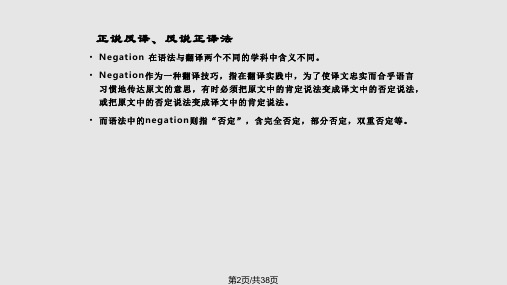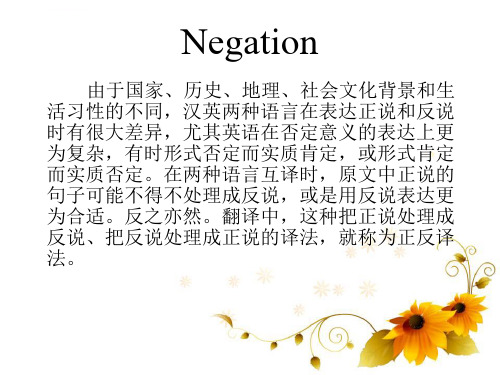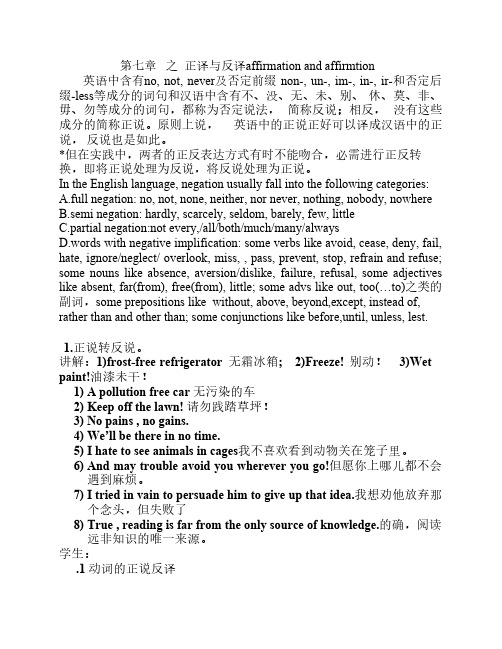第七节正反译法
7 英语正反翻译

7.2 正话反说,肯定译否定
英语中有一些句子,句式是肯定
句,意义却是否定的。可根据词句的 涵义,按汉语表达习惯,肯定译否定,
通顺自然,语言地道。
返回章重点 退出
例1:The window refuses to open.
【译文】窗户打不开。
例2:It is a wise father that knows his own child. 【译文】聪明的父亲也未必了解自己的儿子。 例3:Keep off the grass. 【译文】请勿践踏草坪。
小节结束
返回章重点 退出
8. Lose weight safely and forever. 安全减肥,永不反弹。
课堂互动2: 翻译句子, 注意肯定译否定
1.She was refused admittance by them. 【译文】他们不让她进去。 2.The world today is far from peacefulness. 【译文】今天的世界很不安宁。
返回章重点 退出
7.3 反话反说,否定译否定
英语中有一些否定表达形式,汉语 也可用否定表达形式,但要注意逻辑关 系、上下关系、否定范围,是特指否定 还是泛指否定,是单词、短语否定还是 句子否定,是隐形否定还是显形否定, 只要搞清这些关系,才能把否定译否定 而不改变原文之意。
返回章重点 退出
7.3 反话反说,否定译否定
2.He doesn’t seem to like the idea.
【译文】他似乎不喜欢这个主意。(转移否定)
返回章重点 退出
课堂互动3: 翻译下列句子, 注意否定译否定(参考译文)
3.But all men are not born to reign. 【译文】并非人人生来就都是做帝王的。
翻译课件6-正反译法

正反译法的注意事项
1 专业性
正反译法需要由经验丰富的翻译专家进行操作。
2 文化差异
在正反译过程中需要注意不同语言和文化之间的差异。
3 语法规范
正反译法必须遵循源语言和目标语言的语法规范。
结论和总结
正反译法是一种重要的翻译方法,可提高翻译质量和准确性,但需要注意专 业性、文化差异和语法规范。
正反译法的优势和劣势
1 优势
2 劣势
正反译法有助于提高翻译质量和准确性。
正反译法可能增加翻译时间和成本。
正反译法的实际案例
通过正反译法,我们可以改善以下翻译项目的质量:
文件翻译
正反译法可以确保合同和文件的准确翻译。
软件翻译
正反译法可以帮助开发人员和产品团队进行全球化软件本地化。
学术翻译
正反译法在学术领域中被广泛应用于文献翻译和学术交流。
翻译课件6-正反译法
翻译课件6从目标语言到源语言的翻译,反译即从源语言到目标语言的翻译。
正反译法的应用场景
商业翻译
正反译法在企业营销和品 牌推广中起到至关重要的 作用。
法律翻译
律师使用正反译法来研究 和解释法律文件和法规。
医学翻译
医学翻译员使用正反译法 来确保医疗资源的准确传 达和理解。
正说反译反说正译法

• 那些革命者当时受到拷打,不准阅读任何书 刊..
• The window refuses to open.
single family, was solved quickly by the collective. • 个别家庭无力解决的这个问题,通过集体能迅速得到解决。
第19页/共38页
正说反译法(介词)
• There is nothing in this shop above $5. • 这家商店卖的东西价钱都不超过5美圆。 • Leifeng’s noble deeds are above all praise • 雷锋的高尚事迹令人赞扬不尽。 • He is above meanness and deceit. • 他不至于做卑鄙和欺骗人的事情。 • Her behaviour was above suspicion. • 她的品行不容怀疑、
• 由于看不到、也不去分析语言问题与非语言问题 之间的相互关系,产生了两大不足
• This failure was the making of him.
• 这次不成功是他成功的基础。
• The government第’16s页/f共a38i页lure to carr y out
• Tom will be in charge of the office during my absence. • 我不在的时候,办公室由汤姆负责。 • Why does he say nothing about the total absence from his list
7正反、反正译法

20
课堂互动2: 翻译句子, 注意肯定译否定
1.She was refused admittance by them. 【译文】他们不让她进去。 2.His noble deeds are above all praise. 【译文】他的高尚行为是赞扬不尽的。 3.The mistake escaped me. 【译文】我没注意到这个错误。 4.The truth is quite other than what you think. (other than = not, anything but) 【译文】事实真相与你想的完全不同。
【译文】她忍住没有笑。
例5:The thick carpet killed the sound of my footsteps. 【译文】我走在厚厚的地毯上一点儿声 音也没有。
18
例6:The pursuit of science withdraws interest from external things. 【译文】科学家由于致力于科学研究, 对外界事物总是不感兴趣。 例7: My guess is as good as yours. 【译文】我的猜测并不比你的高明。
正反、反正译法

(二)英译汉反说正译法:英语从反面表达, 汉语从正面表达
反正译是用变换语气的方法把原文的否定式译成 汉语的肯定式。翻译时运用这一方法可使译文自然 流畅。 英语中含有否定词语的结构和双重否定的结构常有 这种方法来解释。英语中表达否定意思的词或词组 指带有de-, dis-, im-, in-, un-, less-等词缀的词和 no, not, not…until, no less than, no more than, Nothing than, nothing but, cannot…too 等表示 否定的词或词组。
赶快把这封信寄出去。
She is no less diligent than her sister. 她和她姐姐一样用功。 Such things couldn’t long escape notice. 这类事情迟早会被人发觉的。 We did not notice this matter until yesterday. 直到昨天我们才注意到这件事。 We can not be too careful in doing experiments. 我们做实验越仔细越好。
(一)英译汉正说反译法:英语从正面表达, 汉语从反面表达
正反译是用变换语气的方法把原文的肯定式译成 汉语的否定式。翻译时运用这一方法可使译文合乎 汉语规范,更恰当地表达原文的意思。
例如, correct 可译成“没有毛病”,wonder可译成 “不知道”,exactly可译成“一点不错”,anythi but可译成“一点也不”等等。
Never too old to learn. 活到老,学到老。 I couldn’t agree more about it. 我对此非常赞同。 His story was nothing but lies. 他的那番话纯粹是谎言。 Our advice was not lost on him. 我们的劝告对他起了作用。 There is no rule but exceptions. 凡规则总有例外。 Don’t lose time in posting this letter.
【翻译技巧】英语笔译技法——正反译法

【翻译技巧】英语笔译技法——正反译法由于国家、历史、地理、社会文化背景和生活习性的不同,汉英两种语言在表达正说和反说时有很大差异,尤其英语在否定意义的表达上更为复杂,有时形式否定而实质肯定,或形式肯定而实质否定。
在两种语言互译时,原文中正说的句子可能不得不处理成反说,或是用反说表达更为合适。
反之亦然。
翻译中,这种把正说处理成反说、把反说处理成正说的译法,就称为正反译法。
正反译法是翻译技巧中的一个重要方法,属于引申和修辞范围。
笼统的说,英语句子中含有“never”、“no”、“not”、“un-”、“im-”、“in-”、“ir-”、“-less”等否定词以及否定前缀或后缀的单词,以及汉语句子中含有“不”、“没”、“无”、“未”、“甭”、“别”、“休”、“莫”、“非”、“勿”、“毋”等否定词的即为反说,不含有这些否定词的即为正说。
但实际操作时,正说和反说的界限又变得极为模糊,例如“correct”可以翻译成“正确”(正说),也可以翻译成“没有毛病”(反说)。
因此,到底译文要采用正说还是反说,就完全要看译文语言的惯用表达和上下文的语气语态了。
在正反译法中,英译汉正转反(正说反译法)和汉译英反转正(反说正译法)是最为重要的两种正反译法。
英译汉正转反英语中有些否定概念是通过含有否定意义或近似否定意义的词来表达的,虽然形式是肯定的,但这类词大多是某些肯定词所引申或变化出来的反义词,或经过长期历史演变而引申出其他否定词义,即所谓的“含蓄否定词”或“暗指否定词”,这类词在译成汉语时,需要变成汉语的否定词组,必要时还需要作词类转换。
1、名词—含蓄否定名词主要有:shortness / shortage(不够;不足)、lack(缺乏;没有)、absence (不在)、failure(未能;不成功)、defiance(不顾;无视)、denial(否认;否定)、exclusion (排除)、freedom(不;免除)、refusal(不愿;不允许)、loss(失去)等。
翻译-正反、反正法.ppt

正说反译法 (Negation)
名词
副词 英语中有些否定概念是通过含有 动词或动词短语 否定意义或近似否定意义的词来表达 形容词或形容词短语 的。这类词从词形上看是肯定式 ,一 介词或介词词组 般被称之为“含蓄否定词”或“暗指 连接词及其短语 否定词”。英语中的含蓄否定词或含 蓄否定短语一般都要译成汉语的否定 某些固定短语
菲利普误了最后一班公共汽车,茫然不知该怎么办。
句子
His grandmother is already 80, but she carries her years lightly.
他祖母已80岁了,可是并不显老。
I am wiser than to believe such stories
我还不至于蠢到竟然相信这种谎言。
他走进那所危楼。
Examples
A radar screen is not unlike a television.
雷达荧光屏跟电视荧光屏一样。
Don’t stop working,” he said
他说:”继续干活吧。”
He knew he was mortally ill.
他知道他得的是不治之症。
从以上例子中,我们可以看到, 有些句子从正面译不顺,不妨从反面 译;反面译不顺,则不妨从正面译, 因为同一个概念,一个民族正着说, 以为是合乎表达习惯的,而另一个民 族则认为反着说才顺嘴。因此,在恰 当的场合灵活运用正反译法不失为确 保译文语义明晰、文从字顺的有效手 段。
Definition
英语里有些从正面表达的词语或句子,汉 译时可以从反面来表达,即正说反译法 (negation); 英语里有些从反面表达的词语或句子,汉 译时可从正面来表达,即反说正译法 (affirmation)。
翻译正说反译法讲解ppt课件

1. We may safely say so. 我们这样说万无一失。
2. The subversion attempts proved predictably futile. 不出所料,颠覆活动证明毫无效果。
3. The capability of sustainable development will be steadily enhanced; the cological environment will be improved. 可持续发展能力不断增强,生态环境得到改善。
(三)形容词
• “It is well you wish this behind her back, else you would have but an unquiet house.” said Nerissa. “亏了你是背着她这么希望,不然的话,你们家可 一定会闹得天翻地覆 的。”倪丽莎说。
2. He was an sort of indecisive person and always capricious.
他这个人 优柔寡断,而且总是反复无常。
3. All the articles are untouchable in the museum. 博物馆内一切展品禁止触摸。
严格执行突发事件上报制度、校外活 动报批 制度等 相关规 章制度 。做到 及时发 现、制 止、汇 报并处 理各类 违纪行 为或突 发事件 。
严格执行突发事件上报制度、校外活 动报批 制度等 相关规 章制度 。做到 及时发 现、制 止、汇 报并处 理各类 违纪行 为或突 发事件 。
反说正译
• 定义:反说正译,即英语从反面表达,译文从正 面表达。就是用转换语气的方法,把原文的否定 式译成汉语的肯定式。
第七章正反译与释义

第七章之正译与反译affirmation and affirmtion 英语中含有no, not, never及否定前缀non-, un-, im-, in-, ir-和否定后缀-less等成分的词句和汉语中含有不、没、无、未、别、休、莫、非、毋、勿等成分的词句,都称为否定说法,简称反说;相反,没有这些成分的简称正说。
原则上说,英语中的正说正好可以译成汉语中的正说,反说也是如此。
*但在实践中,两者的正反表达方式有时不能吻合,必需进行正反转换,即将正说处理为反说,将反说处理为正说。
In the English language, negation usually fall into the following categories:A.full negation: no, not, none, neither, nor never, nothing, nobody, nowhereB.semi negation: hardly, scarcely, seldom, barely, few, littleC.partial negation:not every,/all/both/much/many/alwaysD.words with negative implification: some verbs like avoid, cease, deny, fail, hate, ignore/neglect/ overlook, miss, , pass, prevent, stop, refrain and refuse; some nouns like absence, aversion/dislike, failure, refusal, some adjectives like absent, far(from), free(from), little; some advs like out, too(…to)之类的副词,some prepositions like without, above, beyond,except, instead of, rather than and other than; some conjunctions like before,until, unless, lest.1.正说转反说。
- 1、下载文档前请自行甄别文档内容的完整性,平台不提供额外的编辑、内容补充、找答案等附加服务。
- 2、"仅部分预览"的文档,不可在线预览部分如存在完整性等问题,可反馈申请退款(可完整预览的文档不适用该条件!)。
- 3、如文档侵犯您的权益,请联系客服反馈,我们会尽快为您处理(人工客服工作时间:9:00-18:30)。
第七节:正反、反正表达法(Negation)
1. Our PLA is worthy of being called a great army of the people.
2. He tries his best to overcome the lack of technical data.
3. The window refuses to open.
4. Yesterday he failed to get to school on time.
5. They excluded children (from) getting in.
6. That building is in a state of neglect.
7. He’s often absent-minded.
8. Lei Feng’s noble deeds are above all praise.
9. I, rather than you, should do the work.
10. The truth is quite other than what you think
11. Live up to the expectations of our own people and the people throughout the world.
12. Slips are scarcely avoidable when you’re new to your work.
13. There are two aspects to everything; to say there is only one is to be aware of one aspect and to be ignored of the other.
14. In technology, I think first we have to follow others in most cases, and it is better for us to do so, since that is what we are lacking at present and know little about.
15. The meeting were marked by such an absence of lively discussions that at times they were almost on the point of breaking up.
16. The scientists made a solemn pledge at the conference, saying,“We’ll for ever live up to what our Party expects of us.”
17 The County Party Committee there is ignorant of conditions at the lower levels.
18 The fellow is far from being honest.
19 The city and the areas around it are an ice-free port and a nuclear-weapon-free zone.
20 He stood still, trying vainly (in vain) to answer the battery of questions the boss raised.
21 The world today is far from peaceful.
22 She refrained from laughing.
23 She was refused admittance by them.
24 The evidence is conclusive, excluding all possibilities of doubt
25 Mr. White has refrained from making any official comment on the coup in that country.
26 That served to strengthen instead of weaken our determination (or: That strengthened, rather than weakened, our determination.)
27 But for the workers’ help, we should not have succeeded in this experiment.
28 The first bombs missed the target.
29 Such a chance was denied me
30 This problem is beyond me.
31 When Philip missed the last bus, he was at a loss to know what to do.
32 He unfastened his shoelace.
33 I rode around with him one day seeing how the ships unloaded.
34 Many agreed that the Prime minister had in effect resigned dishonorably.
35 He was an indecisive sort of person and always capricious.
36 It was said that someone had sown discord among them.
37 He manifested a strong dislike for his father’s business.
38 Don’t lose time in posting this letter
39 The significance of these incidents wasn’t lost on us.
40 Such flights couldn’t long escape notice.。
